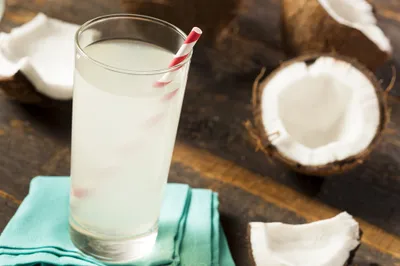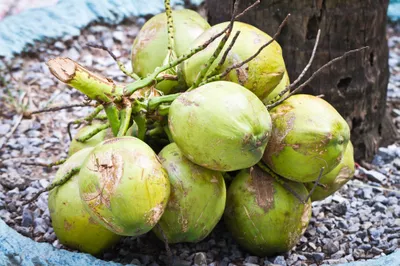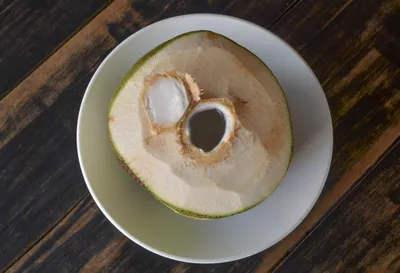When you’re training for endurance sports, you might as well have a downspout attached to your ankle. (Wouldn’t that be better than all-over-body sweating?) As your body loses water at an alarming rate, it calls out for re-hydration. You drink several glasses of water, but notice that doesn’t do the trick. You do your research and learn that you need potassium for hydration and you remember that bananas have lots of the nutrient. But how many bananas can you eat? You have probably also consumed your fair share of sports drinks, but maybe you worry about how good they are for you. In any case, you’re always open to learning about better ways to hydrate. What if that better way has been around for thousands of years and comes straight from nature? Coconut water may be the new wonder health drink, but accounts of its ability to hydrate and heal go way back.
1. What is Coconut Water?
Coconuts grow on trees in tropical and subtropical locations and are part of the daily diet of many people there. They are not actual nuts; rather, they are drupes: a fruit in which an outer fleshy part surrounds a shell of hardened endocarp with a seed inside (according to Wikipedia). When immature, they contain a lot of water and may be harvested for drinking. Coconuts have been sold in North American grocery stores for years, yet haven’t gained prominence in our diets. But in recent years, their water has become incredibly popular, suddenly recognized here for the variety of nutritional benefits that many societies have known about for eons.
2. Why Is Coconut Water Suddenly Popular?
You never know who you’ll meet in a bar. In February 2003, two entrepreneurs were in a Manhattan watering hole and met two Brazilian women. When they asked what the women missed most about Brazil, the women said coconut water. One of these men was smitten with the woman he met and went several months later to visit her (now his wife) in Brazil. While in Brazil, the man researched coconut water. A year later he and his bar-going friend officially launched the company that is now one of the market’s most dominant players. The men are Ira Liran and Michael Kirban and their brand is Vita Coco, a leader in the coconut water marketplace.
3. So Coconut Water Has Been Here All Along?
No, coconut water is not new to the North American marketplace. But it hasn’t been so easy to find until companies like Coca-Cola and PepsiCo began investing in it and celebrities such as Madonna and Demi Moore poured their money and endorsements behind it. Still, coconut water has been available in health food outlets and Asian supermarkets for years, often by way of the world’s top coconut producers: Philippines, Indonesia, India, Brazil, and Sri Lanka.
4. Healthy and Helpful in Emergencies
Firstly, pure coconut water (watch for “pure” on the label) is low in fat, carbohydrates, and naturally occurring sugars. It’s cholesterol-free and contains no artificial sweeteners or additives. It also boasts a variety of vitamins and minerals including zinc, selenium, iodine, sulfur, manganese, ascorbic acid, and B-group vitamins. There is debate about the activity of these vitamins and minerals because of the often long shelf life of manufactured food products in stores. Coconut water is compatible with human blood and according to the United Nations it was used during the Second World War to rehydrate people intravenously in third world nations. At that same time, in the Pacific, it was said to have been siphoned directly from the nut to provide emergency transfusions for wounded soldiers.
5. Helps You Digest and “Go”
The health benefits of coconut water seem to run deep and long, and are believed to include aiding in digestive and urinary ailments. In the tropics it has been used to treat indigestion, constipation, stomach flu, dysentery, bladder infections, intestinal worms, and malfunctioning kidneys. It’s also believed that this natural diuretic can prevent urinary tracts infections and kidney stones. In fact, drinking coconut water up to three times a week may reduce stone size and the need for surgery, according to research from the Philippines. Some experts believe that coconut water is better for hydration while cranberry juice is more effective for aiding in urinary tract infections. However, there is evidence that coconut water aids in alleviating UTIs as well.
6. Hydration Hype
Millions of athletes have come to swear by coconut water as their go-to source of hydration, but the data isn’t conclusive and opinions vary. According to a study published in Medicine & Science in Sports & Exercise, coconut water is as effective as sports drinks and water in replenishing body fluids, but athletes preferred the taste of sports drinks. Sports nutritionist and author Nancy Clark notes that coconut water can only keep you hydrated if you drink large amounts of it. Another study showed that coconut water was easier to consume in large amounts during hydration than commercial sports drinks, and caused less stomach upset and nausea.
7. Taking on Sports Drinks
We understand that coconut water is believed to provide many of the same benefits as formulated sports drinks. Like these drinks, coconut water is rich in the electrolytes calcium, magnesium, phosphorous, sodium, and potassium. Unlike sports drinks, coconut water contains these electrolytes in their natural form. Yet many believe there’s not enough evidence that the human body can distinguish between electrolytes from coconut water and from a sports drink. Plus, sports drinks are considered to be specifically formulated to give athletes a specific level of electrolytes and carbohydrates. Yet it’s hard to dismiss a drink that offers similar benefits in a form that hasn’t been altered by mankind or science.
8. The Anti-Aging Pledge
If something claims to slow down the aging process and isn’t known to be medically harmful, people inevitable jump to get their hands on it. So does coconut water fit into this category? Many users say it helps their skin to look and feel smoother and more youthful. Many even swear that if you apply it directly to your face it can reduce acne, age spots, cellulite, eczema, sagging skin, stretch marks, and wrinkles. Coconut water is a natural source of cytokinins, plant hormones which regulate growth, development, and aging. Cytokinins are rich in antioxidants, potassium, and lauric acid, which are linked to balancing pH levels, strengthening and hydrating connective tissues, and even reducing age-related diseases.
9. The Fresher the Better, and Other Cautions
Anything from nature is best consumed fresh and coconut water is no different, so check the “best before” date before you purchase and consume. Also, while the coconut is not a nut per se, it has some of the properties of nuts. So, if you have nut allergies you are advised to check with you physician before consuming it. Since coconut water is high in potassium and too much potassium can impact the heart, it is advisable to regulate your potassium levels when you drink it. Also beware that coconut water is thought to have a laxative effect.
10. A Highly Profitable Future
The numbers show convincingly that coconut water has become a big part of the push toward healthy living. Global demand has grown by 168-percent since 2010, according to one set of figures. Meanwhile, the number of coconut products launched worldwide skyrocketed by a reported 540-percent between 2008 and 2012. Since coconut water is considered an organic food, it is part of the US organic food market that is currently valued at $65 billion and growing. According to a 2013 marketing research study, people buy coconut water products because they are natural, low in fat, have few known allergens, and come in environmentally friendly packaging. Those that don’t like the taste of pure coconut water may prefer flavored or carbonated versions.













